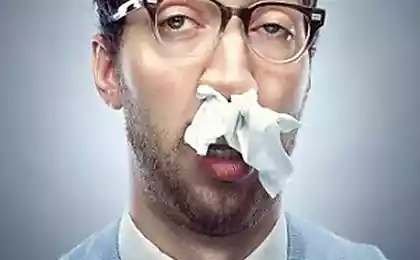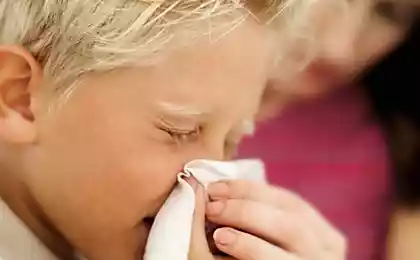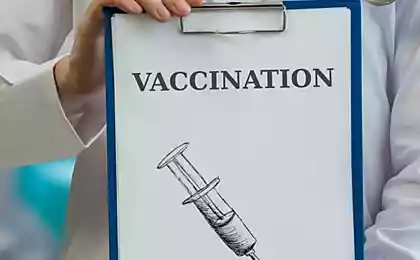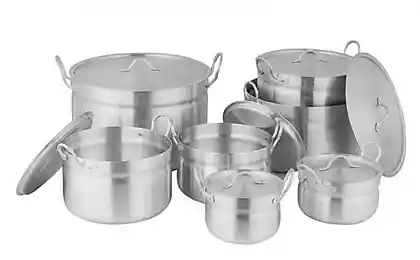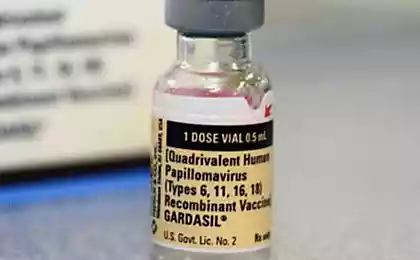462
Why flu vaccine may be more dangerous than the flu
When it comes to the flu and vaccines against it, opinions can be heard as much as men. One thing is certain — if you want to liven up some discussion, just say publicly that you are against vaccinating for the flu. Almost immediately you will find your opponent in a dispute.

Although who and provides as vaccines against seasonal and common flu, are there better ways to protect against influenza ?
First, it is important to try to separate a cold from flu and other viral diseases.
The influenza, or as it is commonly called — the flu does seem to be nowhere, and quickly puts the sufferer in bed. This viral infection usually lasts about a week and affects the nose, bronchi and sometimes the lungs.
The disease is characterized by the following symptoms:
Fever
Muscle malaise
Headache
Sore throat
Stuffy nose
Lethargy and drowsiness
Cough (usually unproductive)
Remember that all of these symptoms also occur with other viral illnesses and the common cold, but the difference in the case of flu is that its symptoms occur suddenly and are more difficult.
There is a lot we now know about influenza, and many of us have been sick many times. So why many people and even governments start to panic, trying to get the flu vaccine?
If your immune system is strong enough, although the flu and will be unpleasant, your body will be able to recover from it within 1-2 weeks. However, there are several groups that are at higher risk of developing complications from the flu.
The biggest risk group are the elderly, children and people with serious health problems. There is an assumption that people in these risk groups will not survive the pneumonia and can die from the flu.
Why are so many people opposed to the flu?
Today many doctors, researchers and scientists disagree with government organizations that promote vaccines. What they are concerned about?
Mostly their fears that vaccines cause wrong immune response. The response of the immune system is the TH2, which is emergency response, characterized by inflammation, leading to further complication, rather than the desired TH1 immune response.
There are also concerns based on studies that show that vaccines do not provide an adequate level of protection for high-risk groups that they serve to protect.
According to research by Dr. Lisa Jackson from Seattle, there is no difference in the number of deaths from pneumnia between groups of elderly persons who were vaccinated against influenza, and those who have not been vaccinated.
Many vaccines also contained controversial elements. They can include mercury, aluminum, formaldehyde, and even tissue of aborted embryos.
To flu shot or not to do, is a personal choice. Everyone should adopt the facts, know their own health status, and on this basis to make decisions for themselves and their families. Useful tools for the prevention of influenza that will protect the body from disease.
Regardless of your decision regarding vaccination this year, you need to take certain steps to protect against flu, colds, other viral infections and chronic diseases.
If you enough improve your immune system, you will not only be able to recover faster from colds or flu, but to prevent them.
The approximate treatment of colds in the home is as follows: drink plenty of pure water, get enough sleep, eat fresh and natural foods and avoid processed foods and reduce the amount of stress, avoid sugar, and exercise 2-4 times a week.
This will allow you to keep the immune system stable and balanced, so she can fight the flu without the use of dangerous vaccines.
source: mixednews.ru
Source: /users/1077

Although who and provides as vaccines against seasonal and common flu, are there better ways to protect against influenza ?
First, it is important to try to separate a cold from flu and other viral diseases.
The influenza, or as it is commonly called — the flu does seem to be nowhere, and quickly puts the sufferer in bed. This viral infection usually lasts about a week and affects the nose, bronchi and sometimes the lungs.
The disease is characterized by the following symptoms:
Fever
Muscle malaise
Headache
Sore throat
Stuffy nose
Lethargy and drowsiness
Cough (usually unproductive)
Remember that all of these symptoms also occur with other viral illnesses and the common cold, but the difference in the case of flu is that its symptoms occur suddenly and are more difficult.
There is a lot we now know about influenza, and many of us have been sick many times. So why many people and even governments start to panic, trying to get the flu vaccine?
If your immune system is strong enough, although the flu and will be unpleasant, your body will be able to recover from it within 1-2 weeks. However, there are several groups that are at higher risk of developing complications from the flu.
The biggest risk group are the elderly, children and people with serious health problems. There is an assumption that people in these risk groups will not survive the pneumonia and can die from the flu.
Why are so many people opposed to the flu?
Today many doctors, researchers and scientists disagree with government organizations that promote vaccines. What they are concerned about?
Mostly their fears that vaccines cause wrong immune response. The response of the immune system is the TH2, which is emergency response, characterized by inflammation, leading to further complication, rather than the desired TH1 immune response.
There are also concerns based on studies that show that vaccines do not provide an adequate level of protection for high-risk groups that they serve to protect.
According to research by Dr. Lisa Jackson from Seattle, there is no difference in the number of deaths from pneumnia between groups of elderly persons who were vaccinated against influenza, and those who have not been vaccinated.
Many vaccines also contained controversial elements. They can include mercury, aluminum, formaldehyde, and even tissue of aborted embryos.
To flu shot or not to do, is a personal choice. Everyone should adopt the facts, know their own health status, and on this basis to make decisions for themselves and their families. Useful tools for the prevention of influenza that will protect the body from disease.
Regardless of your decision regarding vaccination this year, you need to take certain steps to protect against flu, colds, other viral infections and chronic diseases.
If you enough improve your immune system, you will not only be able to recover faster from colds or flu, but to prevent them.
The approximate treatment of colds in the home is as follows: drink plenty of pure water, get enough sleep, eat fresh and natural foods and avoid processed foods and reduce the amount of stress, avoid sugar, and exercise 2-4 times a week.
This will allow you to keep the immune system stable and balanced, so she can fight the flu without the use of dangerous vaccines.
source: mixednews.ru
Source: /users/1077





